Authors: Sonia Ferdous Hoque, Robert Hope, Sharif Tanjim Arif, Tanjila Akhter, Maheen Naz, Mashfiqus Salehin
Groundwater resources in deltaic regions are vulnerable to contamination by saline seawater, posing significant crisis for drinking water. Current policy and practice of building water supply infrastructure, without adequate hydrogeological analysis and institutional coordination are failing to provide basic drinking water services for millions of poor people in such difficult hydrogeological contexts. We apply a social-ecological systems approach to examine interdisciplinary data from hydrogeological mapping, a water infrastructure audit, 2103 household surveys, focus group discussions and interviews to evaluate the risks to drinking water security in one of 139 polders in coastal Bangladesh. We find that increasing access through public tubewells is common but insufficient to reduce drinking water risks. In response, there has been a four-fold growth in private investments in shallow tubewells with new technologies and entrepreneurial models to mitigate groundwater salinity. Despite these interventions, poor households in water-stressed environments face significant trade-offs in drinking water quality, accessibility and affordability. We argue that institutional coordination and hydrogeological monitoring at a systems level is necessary to mitigate socio-ecological risks for more equitable and efficient outcomes.

